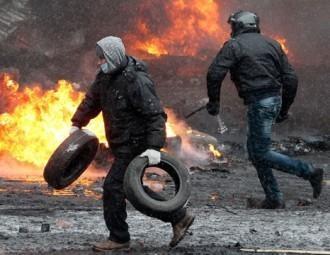Elena Tonkacheva: Negotiations don’t change situation with human rights in Kiev

Moreover, there is high probability that the so-called armistice might lead to its worsening, the head of Lawtrend believes.
In the interview with the “EuroBelarus” Information Service Elena Tonkacheva, the head of the Legal Transformation Centre “Lawtrend”, summed up the results working tour to Kiev, where she participated in the work of “Euromaidan-SOS” group.
- The work of the human right fighters in Ukraine includes a number of interrelated areas, the most time-consuming and labor-consuming among which is search for the missing people. Usually such situations result from arrests or from some critical situations when people are placed to hospitals. The process is hindered due to the lack of trust between the people and the law enforcement agencies. People often blame the authorities, police and “Berkut” for the missing people, even if their suppositions are unfounded.
The second area we are working with is monitoring of court trials. The arrests are going on, and trials are snowballing. And third area of work, which is both difficult and important, is coordination of requests that come from people at Maidan and in Kiev. Citizens often offer their help, legal aid, medicines, medical care, warm clothes and emergency supplies.
It is of no less importance to keep people and Media informed about the situation with human rights. That includes communication with foreign and international human rights groups on development of demands, which would be shared by all human rights and civil groups in order to develop common stance for international reaction to the events in Ukraine.
Besides, we are also developing instruments and are preparing for the trials that are likely to start in a few months.
- Maidan is spreading into the regions; is “Euromaidan-SOS” group working throughout the country?
- The group seeks to cover the information that is coming from the regions; however, we do not gather information from the regions on purpose. I think that on a local level self-organization plays the key role. High level of self-organization and solidarity is the leitmotif of the Ukrainian events in general. And “Euromaidan-SOS” group is a unique and extremely effective initiative, and acquires more and more users, who trust in it.
- How is the communication with the state going on?
- It depends on the goal of this communication. In a regular situation state bodies answer the requests we make, though it becomes more difficult to communicate in critical situations. But if we compare Belarus and Ukraine, I would say that even though Ukrainian police officers do not react as quickly as we want them too, it is still much quicker than Belarusan police officers do.
- Situation is changing quickly; after negotiations between the President and the opposition some hold the view that confrontation will soon be resolved. What are human rights activists thinking about that?
- Regardless of how the political dialog is developing, problems remain. Thus, there is still no answer to the question of the necessity to investigate all the cases of armed clashes which took place at Maidan. With or without negotiations, there are a number of deaths; more than 300 people resorted to medical service because of serious injuries. Besides, the question of people arrested in connection with the criminal actions – organization of mass disorder – remains at issue, and that number exceed 120 people. Approximately the next 2 months people will remain in prison. All the attention of the Media is concentrated around the armistice; however, during this so-called armistice current Ukrainian laws were broken, which means that we are having a new conflict between citizens and law enforcement agencies. So from the human rights prospective this armistice doesn’t change much; not only the situation hasn’t improved, but it might well be worsened. Political process is unequal to the events happening in real life; that is how the situation can be characterized today.
-
03.01
-
07.10
-
22.09
-
17.08
-
12.08
-
30.09



























